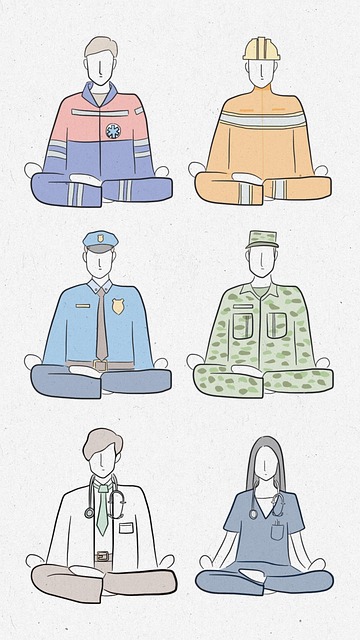Wheat Ridge Stress Management Therapy (WR SMT) employs the Recovery, Flexibility, and Mastery (RFM) framework to build resilience, a key stress management tool. This approach combines psychological strategies and practical activities like emotional intelligence training and journaling for self-awareness and healthy coping mechanisms. RFM therapy helps individuals manage high-pressure situations, reduce burnout, and improve patient care, particularly beneficial for healthcare providers. WR SMT measures success through goal setting and progress evaluation, ensuring tailored strategies for emotional resilience, mood management, and overall mental wellness.
Discover the transformative power of RFM (Resilience, Flexibility, and Mastery) in tackling stress. This article explores how Wheat Ridge Stress Management Therapy leverages RFM to build resilience. We’ll delve into the science behind it, from understanding the role of RFM in managing stress to designing tailored exercises for optimal impact. Learn about its clinical implementation, measurement of success, and adjustments to tailor this innovative approach to individual needs.
- Understanding RFM and Its Role in Stress Management
- Designing Effective Resilience-Building Exercises
- Implementing RFM Therapy in a Clinical Setting
- Measuring Success and Adjusting the RFM Approach
Understanding RFM and Its Role in Stress Management

Resilience is a vital tool in managing stress, and RFM (Recovery, Flexibility, and Mastery) exercises offer an effective framework to enhance it. These exercises are designed to help individuals cope with challenging situations and rebuild after adverse events. By focusing on recovery from past traumas or stressful incidents, flexibility in adapting to changing circumstances, and mastery over one’s thoughts and actions, RFM strengthens the mind’s ability to navigate difficult times.
Wheat Ridge Stress Management Therapy incorporates RFM techniques into its practice, targeting not only individual well-being but also Burnout Prevention Strategies for Healthcare Providers. The approach is particularly relevant in high-pressure fields like healthcare, where Crisis Intervention Guidance and Cultural Sensitivity in Mental Healthcare Practice are essential. Through RFM exercises, providers can improve their resilience, leading to better patient care and personal satisfaction.
Designing Effective Resilience-Building Exercises

Designing effective resilience-building exercises involves a thoughtful blend of psychological strategies and practical activities tailored to individual needs. At Wheat Ridge Stress Management Therapy, we believe in fostering inner strength development through diverse methods that extend beyond traditional talk therapy. Incorporating techniques such as emotional intelligence training and mental wellness journaling exercise guidance allows for a holistic approach, empowering individuals to navigate challenges with greater ease.
These exercises should be designed to promote self-awareness, encourage healthy coping mechanisms, and build emotional resilience. By integrating activities that challenge individuals to step outside their comfort zones, we facilitate the development of a robust inner strength. Whether it’s through guided meditations, cognitive reframing practices, or creative expression, each exercise is carefully crafted to nurture emotional intelligence and enhance overall mental wellness.
Implementing RFM Therapy in a Clinical Setting

Implementing RFM (Resilience, Flexibility, and Mastery) Therapy in a clinical setting offers a transformative approach to supporting individuals dealing with stress, anxiety, and even trauma. This evidence-based method, like Wheat Ridge Stress Management Therapy, focuses on fostering resilience by teaching practical skills to navigate life’s challenges. By integrating RFM into therapy sessions, mental health professionals can empower clients to manage symptoms of depression prevention and reduce the impact of past traumatic experiences, enhancing overall well-being.
The integration of RFM Therapy aligns with broader Mental Illness Stigma Reduction Efforts, as it promotes self-efficacy and empowers individuals to take charge of their mental health. This proactive approach not only aids in Trauma Support Services but also equips people with tools for long-term resilience, encouraging a more adaptive and positive response to stressful situations.
Measuring Success and Adjusting the RFM Approach

Measuring success is a vital aspect of any therapy approach, including Wheat Ridge Stress Management Therapy (WR SMT). When implementing RFM exercises, therapists should set clear and achievable goals tailored to each client’s needs. Regularly evaluating progress allows for a dynamic adjustment of strategies, ensuring the effectiveness of WR SMT. This iterative process involves assessing changes in clients’ emotional resilience, coping mechanisms, and overall mood management skills.
By tracking these improvements, therapists can identify which aspects of RFM are most beneficial and adapt their approach accordingly. This continuous refinement is crucial in fostering empathy-building strategies, as it enables the therapist to cater to individual client progress, enhancing the overall Mental Wellness Podcast Series Production quality and relevance.
Wheat Ridge Stress Management Therapy leverages RFM (Resilience, Flexibility, and Mastery) exercises as a powerful tool for building mental fortitude. By integrating these strategies into clinical settings, practitioners can effectively support individuals in navigating life’s challenges with resilience. Through tailored designs and precise measurements, RFM therapy empowers clients to manage stress, fostering adaptability and a sense of control. This holistic approach holds promise for enhancing overall well-being and quality of life.









